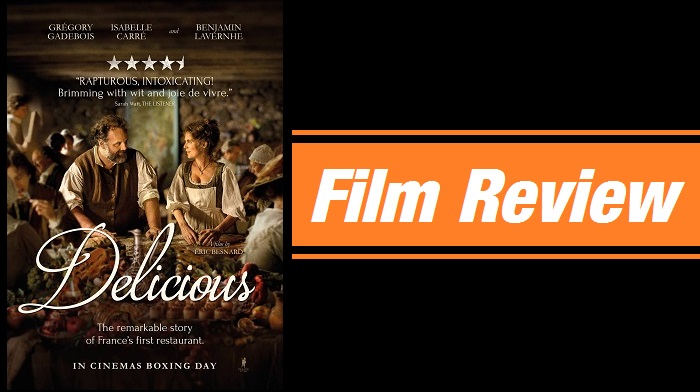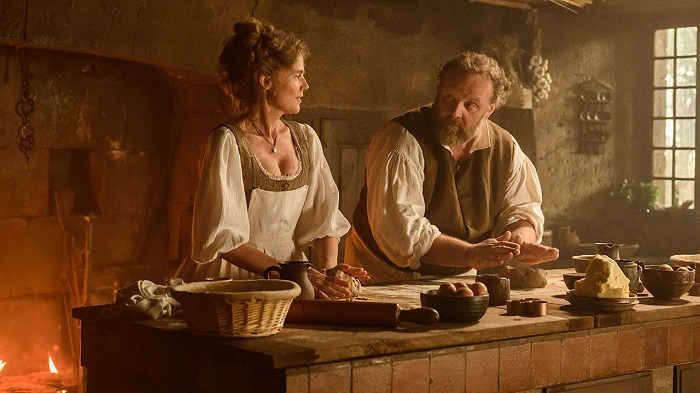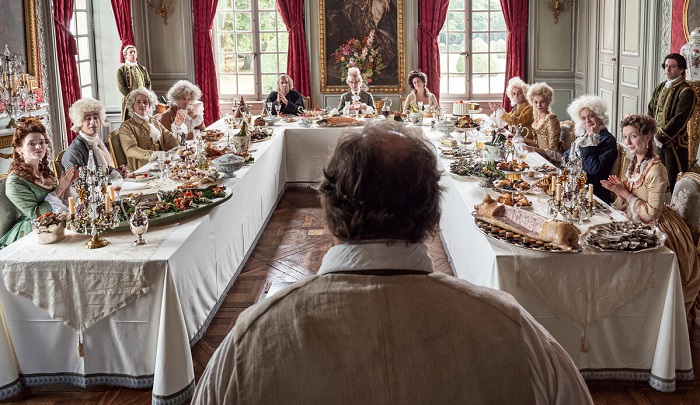The French period drama “Delicious” is (pardon the corniness) a mouthwatering mix of character, country, and cuisine. Written and directed by Éric Besnard and featuring some of the most exquisite cinematography you’ll see, “Delicious” pulls from real history to help tell its largely fictional but utterly compelling story of France’s very first restaurant. At the time, Inns and lodges provided small meals for weary travelers, but the idea of a walk-in restaurant as we know it today didn’t yet exist.
The film is set in 1789 with France on the eve of a Revolution. It’s a time of growing unrest as commoners scrounge for food across the famine stricken countryside. Meanwhile France’s nobility fill their bellies with lavish, meticulously prepared gourmet meals, even using their gastronomical overindulgence as a symbol of power and to flaunt their status.
The film opens with one such extravagant meal being prepared. The camera and the sound design vividly captures the energy and bustle of chef Pierre Manceron’s kitchen. Pierre (a terrific Grégory Gadebois) is the personal chef to the haughty Duke of Chamfort (a wonderfully pompous Benjamin Laverhne). He and his team of cooks rush to put the finishing touches on a lavish dinner he’s preparing for the Duke and his blue-blooded guests.
After the meal Pierre is summoned to the dining area for “comments”. What follows is a scene that highlights both the absurdity as well as the hypocrisy of the aristocracy. At first Pierre is showered with compliments from the table. But then one particularly grumpy friar takes a shot at his lovingly manicured appetizer. “That is your only false note,” he grumbles. It immediately sets off a barrage of insults and ridicule from the very people who were just singing his praises. An embarrassed Duke demands his humiliated chef apologizes. When Pierre refuses, he is promptly fired.
With his Rousseau-quoting son Benjamin (Lorenzo Lefèbvre) in tow, a dejected Pierre retreats to a ramshackle old inn once ran by his late father. There he’s content with letting his dream die. “I’ve lost the taste for cooking,” laments the defeated master chef. Instead he fixes up and reopens the inn, providing a rest place for travelers to stop, stretch their legs, and feed their horses. And for those hungry, there’s no Duck à l’Orange, Braised Pork, or Boeuf Bourguignon. Nope, it’s lukewarm broth over a piece of bread. Bon appétit!
Soon after, a mysterious woman named Louise (Isabelle Carré) arrives on a passing stagecoach asking to be Pierre’s apprentice. “Sorry, I don’t cook anymore,” he grumbles. When she refuses to leave he tries discouraging her with his chauvinistic barbs. “Cuisine is a man’s affair,” he chides. “Women don’t understand it.” Yet Louise stays and over time not only earns Pierre’s trust, but inspires him to look beyond his own self-pity and vainglorious goals.
“Delicious” avoids any dewy-eyed and mawkish trappings by throwing us a few curveballs in its final act. They don’t exactly feel in tune with the rest of the story, but the twists (mild as they are) allow the film more time to dig into the widening gap between the haves and the have-nots. Food proves to be a good tool to do it. Where the Duke and his ilk arrogantly believe that “common people” aren’t capable of properly appreciating cuisine, Pierre and Louise set out to create a place where everyone, regardless of status, can enjoy the happiness and comfort of good dining.
Through it all DP Jean-Marie Dreujou’s breathtaking images go well beyond the sumptuous dishes. The rolling hills, the grassy meadows, the autumn colors – they are all shot with a painterly beauty and would make for a stunning coffee table book. And there are several visual tricks that really impress. Such as one scene where the camera sits outside of Pierre’s inn and we watch a seasonal transition sped up for affect. That sequence is a pure delight, as are several other memorable visual moments.
History says that the first restaurant was actually Le Grande Taverne des Londres which opened in Paris several years before “Delicious” takes place. While the movie creates its own fictionalized origin story, it feels so much a part of that era that you would never question its authenticity. There are some other touches that really enhance the story. For example, there’s a genuine warmth in watching Manceron and Louise inevitably grow closer. And with the French Revolution knocking on the door, having young Benjamin as the voice of the people reminds us that change is on the way. It will come at a sobering cost, but change is coming nonetheless. “Delicious” is now available in select theaters and on VOD.





What no horror bits??? 🤣😉 this sounds right up my street!
No horror at all. Just a beautiful period drama. SEE IT!
I will reserve the rest of your review for after I watch it. One thing I noticed right off the bat is the light in that first image. Sold! Looks like my kind of movie.
and the other images also!
Oh the entire visual style of this is breathtaking. Great costumes, production design, the works. It had me under its spell at the title screen!
Oh, I will add this to my watchlist!
Awesome! I hope more people do the same.